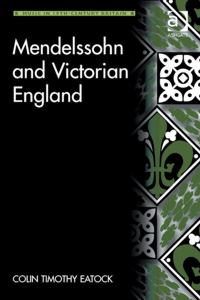
Ashgate
206 pages, illustrations; $99.95 US
German composer Felix Mendelssohn, whose two-hundredth birthday is being celebrated this year, first visited England when he was twenty years old. He made nine more trips before he died in 1847, when he was just thirty-eight years old. It was in England that he scored his earliest successes, and for much of his career he was more appreciated in London than in his hometown of Berlin. In fact, as Colin Eatock writes in this groundbreaking study, “his musical ideals were uncannily aligned with the predominant English tastes of the mid-nineteenth century.”
Eatock, a composer, scholar and journalist who recently became editor of this magazine, paints a vivid picture of Mendelssohn’s visits to England. He describes how many of Mendelssohn’s works were directly inspired by his travels around the British Isles, works like the ‘Scottish’ Symphony, The Hebrides overture, the three Fantasias, which he called his ‘Welsh’ piano pieces, as well as a number of Lieder ohne Worte, including the familiar Frühlingslied. The String Quartet Op.12 was written in London, and the ending of the ‘Reformation’ Symphony came to him at the bottom of a mine in Wales. Mendelssohn immersed himself in English musical life, even accompanying Queen Victoria on the piano as she sang songs written by him and his sister Fanny. No wonder a newspaper of the time called him an ‘adopted son of England.’
But what is even more significant for Eatock than the influence England had on Mendelssohn’s music is the influence Mendelssohn had on British music. Mendelssohn, writes Eatock, “did more to improve the status of music in England than any other continental composer of the nineteenth century.” In fact, he claims, he “shaped the nation’s musical values.” Yet following Mendelssohn’s death, his reputation in Britain declined. Eatock links the shift in attitudes towards his music to growing English nationalism and its unfortunate companion, anti-Semitism – even though Mendelssohn, who was born Jewish, had been baptized as a Lutheran when he was seven years old.
With quotations from contemporary sources, especially Mendelssohn’s letters, detailed footnotes and a useful glossary of names, this fascinating study of Mendelssohn’s ties to England deepens our understanding of his work, and increases our appreciation of his accomplishments.
Pamela Margles, theWholeNote’s regular book reviewer, can be contacted at
bookshelf@thewholenote.com



